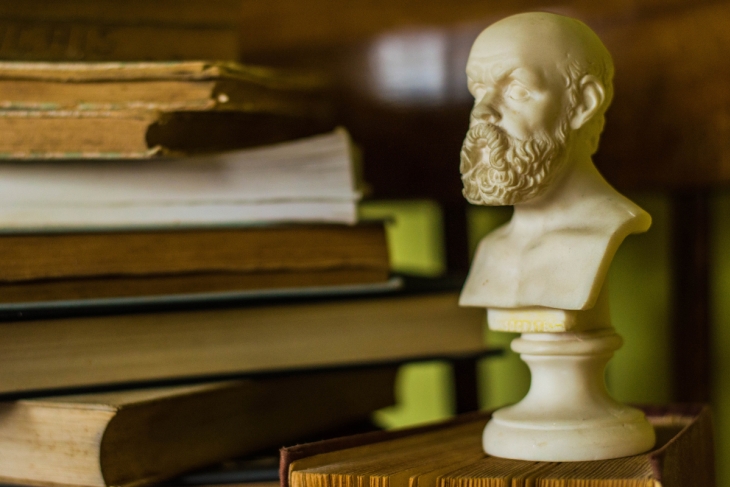“This is a book about my liberal education,” begins Roosevelt Montás’s book, Rescuing Socrates. Through four lengthy chapters, he details “the way in which liberal education has altered and enriched the trajectory of my life.” The book—which effortlessly swings between Montás’s own story and his meditations on the Western scholarly tradition—defies easy categorization. It is part memoir, part history of ideas, and part undergrad course syllabus.
Liberal education, by which students develop competencies in multiple humanistic disciplines such as literature, art, history, and philosophy, is the ideal education for the virtuous citizen in Montás’s view. Its central feature is “its concern with the condition of human freedom and self-determination.” As distinguished from professional and technical educations, it “looks to the meaning of human life beyond the requirements of subsistence—instead of asking how to make a living, liberal education asks what living is for.” And it often incorporates classic texts into its curricula.
The last component is familiar to Montás, who is a senior lecturer at Columbia University’s Center for American Studies, and previously was director of that institution’s Center for the Core Curriculum. A long-lived and much-lauded type of Great Books program, Columbia’s core curriculum takes first year undergrads on a journey of literary and philosophical masterworks from antiquity to the present day. Their authors—St. Augustine, Plato, Aristotle, Freud, Nietzsche, Gandhi—fill the pages of Montás’s book.
As the author readily admits, this mode of education has fallen out of favor in recent decades. In her review of the same book, Naomi Shaefer Riley notes that “today’s most fortunate students are rarely getting an actual liberal arts education,” and when they do, “they spend a lot of time protesting its bias and its irrelevance.” Derided as too old, too white, too male, too Western, texts such as The Republic and The Iliad are being abandoned by American educators. “Be like Odysseus and embrace the long haul to liberation (and then take the Odyssey out of your curriculum because it’s trash),” a teacher tweeted in June. A high school teacher responded, “Very proud to say we got the Odyssey removed from the curriculum this year!”
It is not surprising that Montás discovers Plato exactly there: in the trash. Passing by a pile of garbage left on the street corner one winter night in the late ‘80s, a teenaged Montás notices a stack of hardback books. One is a copy of Plato’s dialogues. He rescues the book from the heap (providing the inspiration for the book’s title) and takes a giant leap forward on his academic journey, one that eventually leads him through the ivy gates.
It is a fascinating journey, one both intellectual and geographical. Born into poverty in the Dominican Republic, Montás made his way to New York City with his older brother just before his twelfth birthday. His mother had emigrated years before to establish a life for her family. His father, a would-be Marxist revolutionary, left the family early on to return to the Dominican Republic. Unfamiliar with American culture and speaking almost no English, Montás struggled to find his place in his new homeland. Unprepared for winter, he shivered in a leather jacket, not knowing the value of down-filled coats. His assimilation began with his discovery of Plato.
Like the classical canon itself, assimilation is increasingly viewed as a relic of a past, less-enlightened age. The commandments of identity politics tell us not only to respect our cultural differences, but also to exalt them. Nowhere is this tenet as faithfully observed as in academe. “The idea that there can be an American culture that everyone joins seems to be anathema to some academic thinkers,” acclaimed education thinker E.D. Hirsh told the Wall Street Journal in an interview last year.
“A liberal education can only take place when those notions [of identity] are held lightly and seen through,” Montás tells us. His initiation into the classics is not coercive or “problematic,” to borrow a term du jour. Instead, Montás discovered that, “As a young person trying to understand what it meant to be who I was and to be where I was, I found Plato a genuine affirmation of my identity.” This identity is not limited to race, ethnicity, or immigration status, “but something more fundamental.” The Platonic dialogues, in which the philosopher Socrates fearlessly pursues truth, beauty, and goodness through conversations with the citizenry of Athens, “pointed toward what felt like the most worthwhile way of living for me.” The reader infers that Montás has rescued Socrates and the ancient teacher has returned the favor.
Moral relativism is another progressive ideal that Montás rebukes. The purpose of education is not only the intellectual development of the student, but also the moral cultivation of the citizen. “Liberal education is not possible without a recognition that inquiry into the life of virtue—that is, into the best and most excellent life for a human to live—is not a futile endeavor but, in fact, leads to a deeper self-understanding and, in this sense, a fuller life.” The polymath scholar John McWhorter, who also taught a one of Columbia’s core curriculum courses, noted that doing so “made a better person out of me, as well as the dozens of students I ushered through it.” Yet educators have dumped this moral cultivation, much like the volume of Plato that Montás discovered in the trash. This dereliction of duty begins in our compulsory K–12 schools. A fly on the wall in any American elementary classroom would hear more about self-esteem than about virtue.
Montás’s convincingly makes the argument that the classics enrich any life pursuit. By doing so, his story should appeal to anyone who cares about education. There is something here to illuminate and inspire, for both curricular traditionalists and progressive educators, for both pragmatic business majors and idealistic scholars of philosophy. At the very least, it will motivate the reader to think twice before tossing away that dusty volume of The Odyssey.


